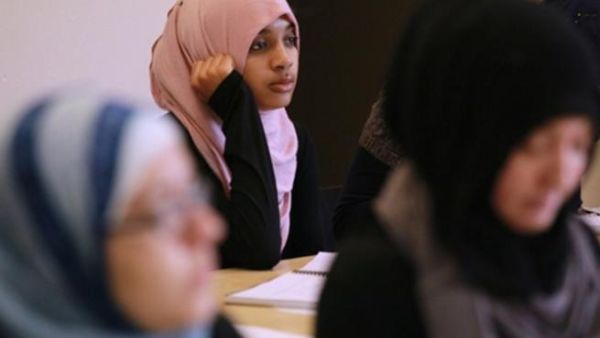Islah Abdul Qader is a divorced mother of two teenage boys and at 33 is reading a bachelor's of Health Sciences at Sharjah Women's College (SWC). However, it is her pursuit of education driven by a will to survive that has helped her crawl out of what she describes as a dark hole that has been the first half of her life.
Islah was married at 16 and divorced nearly four years later, aged 20. While her peers were enjoying life, Islah had to worry about getting treatment for her heroin-addicted husband.
Yet her life did not start out that way. She comes from a middle-class Emirati family that worked hard to make ends meet.
When she chose to marry young, to a 21-year-old, she could never have imagined what the future had in store.
"It was completely my choice and nobody forced me," she said. "I didn't think of the future — I was in the moment and thought of having children and creating a home. I thought I'd deal with the future tomorrow."
Yet things quickly changed. "He [her husband] got involved with some guys who started him on drugs, at first it was hashish, then it quickly turned into heroin injections," she said.
Shortly after the changes showed up in his behaviour and lifestyle, Islah's husband was jailed for drug abuse, after which she filed for divorce.
She was left alone with no money or job, a family unable to financially support her and two sons aged three and one.
Survival through education
A barely educated Islah took to driving a Dubai taxi to keep her family afloat. "When I got divorced I wanted to work, but hadn't finished my studies and my parents couldn't help me financially," she said. "The whole world was black to me because I didn't have wasta [connections] to get a good job and survive, so I took up a job as a taxi driver."
However, her stint as a taxi driver did not last long because of harassment from her male colleagues. So she quit, and while working as a sales woman in a retail clothing shop, she managed to finish secondary school while studying part-time in the evenings. She then joined SWC and finished a diploma certificate that enabled her to begin a bachelor's degree, all the while staying silent about her circumstances.
"Education was a survival tool for Islah," said Fadwa Lkorchy, Head Counsellor at SWC. "It opened up a window of opportunity which helped her support the kids, because she needed to work but didn't want to be confined to menial jobs.
"There were days when I didn't know how I was going to cope with all the debt and problems," said Islah. "When I thought of studying I felt some hope and when I actually started, the world began to open up for me."
It was only when Islah began to miss classes because of custody battle with her ex-husband following his release from jail that Islah's situation became known to the college administration.
"I never spoke about my situation until the last year of my diploma course when my ex-husband came out of jail and wanted to take away the kids, I was ashamed," said Islah. "My attendance was poor and the dean wanted to know why so I told him... they were really shocked."
Handle with care
Although Islah's circumstances and those similar may be rare, Fadwa believes it important that their stories are told. "Although the majority is not like that, a lot of them struggle in different ways," she said. "Whether it's a struggle to get educated with a controlling brother or anything else, most of the girls at the college see education as a way out, or at least a temporary way out of the house." For those students who seek counselling while at the college, Lkorchy believes a deep understanding of their mentality and background is imperative when it comes to helping them. Something not always considered by the largely expatriate population of counsellors practising in the country.
"I don't think we are employing people at federal universities who are qualified enough for this region because they are not culturally sensitive," said Lkorchy. "The feminist movement happened years ago in the West and the counsellors come here with their own set of beliefs and values, unable to understand the client in front of them."
It is the mix of a religious and trad-itional upbringing with a rapidly globalising society that Lkorchy believes calls for such delicate counselling techniques in the UAE and throughout the Middle East.
"Counselling an Arab and/or Muslim client is mingled with a lot of things, most importantly their spirituality," she said.
Keeping an open mind
However, Suhair Awadallah, a counsellor at Zayed University, believes the problem of expatriate counsellors understanding the intricacies of a foreign culture, when treating students in the UAE, is already being addressed. "Things are changing. They are not like they used to be," said Suhair. "Most of the public universities in the country are keen to select counsellors from the same culture, either Arabic or Emirati."
Nevertheless, Margaret Wood, programme leader of the bachelors of social work at SWC, believes expatriate counsellors should be open to learning new ways of applying the Western model of counselling.
"In the West while counselling, we will compartmentalise a person's issues and experiences, not necessarily looking at the whole person and their family values, religious and cultural traditions," she said.
She has been in the UAE almost two years and found she had to do a lot of reading and research in order to understand her students.
"I spend a lot of time outside of college with Emirati people to immerse myself in the culture," said Wood.
However, an openness to change is what, Wood believes, will truly help tackle society's social issues when it comes to counselling students like Islah. "We could take a colonial approach that says the Western way is the right way of doing things, but counsellors like that won't last, because people won't want their help."








